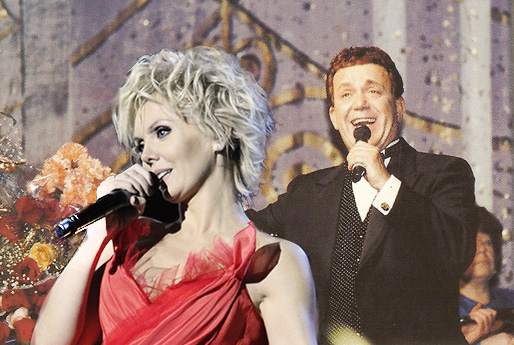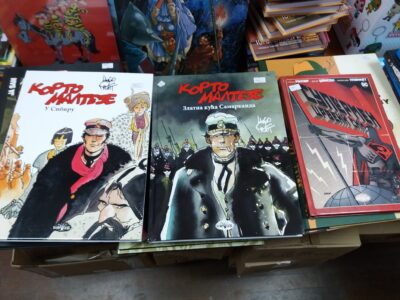
Valeriya and Kobzon. Composite image mixed by Nina Mashurova with images from valeriya.net and iosifkobzon.ru.
When Russian singer Valeriya came to London to perform on October 21, no one expected a scandal. But as she arrived at the Royal Albert Hall for her concert, which she was supposed to perform with fellow crooner Iosef Kobzon, she was met with over one hundred anti-Putin protesters. They wore Ukrainian flags and had anti-Russian posters that said ‘Ukrainian blood on Putin’s hands,” “Valeriya and Kobzon – Putin’s voices of war and death” and “Putin’s puppets and terrorist-bakers – out of London.”
Russia and Ukraine have been going back and forth banning musicians from each other’s countries, as part of an upswing of acrimonious patriotism in the wake of this summer’s military conflict. But recent events demonstrate that the soft power struggle is making waves that extend beyond the two countries – pro-Russian artists are facing international protests and bans for their support of Putin.
[Video of the BBC interviewing some people who attended the concert. At the end of the video, you can see Yevgeny Chichvarkin, a prominent Russian businessman in exile, who holds a poster that says ‘No Putin – no war’]
Valeriya (born Alla Yurievna Perfilova) and Kobzon (Iosef Kobzon), were among 500 Russian artists who signed an open letter in support of Putin’s annexation of Crimea last March. Although Valeriya has no record of political activism beyond signing the letter, Kobzon is an MP in the Duma as well as a singer.
A month prior to the concert, some activists from the London-based Speak Up movement sent a petition to the UK Government asking politicians to ban Valeriya, Iosef Kobzon and other Russian singers from performing in the country. “Stop Iosif KOBZON and other members of Kremlin's cheerleading team from entering the UK or any other democratic country,” – the petition said. Over four thousand people signed the petition, endorsing denying entry to the singers.
Activists from the London Euromaidan sent a letter to Chris Cotton, the CEO of the Royal Albert Hall, asking him to cancel the concert. Cotton refused, saying, “The Royal Albert Hall is hosting these events on purely artistic grounds based on the international artistic reputation of Valeriya and her special guests. We are not and would never be doing so on the basis of her or any other artist’s personal or political views or nationality.”
Oleg Skripka, a leader of the Ukrainian rock band Vopli Vidopliassova, refused to perform during Valreiya’s concert. “When I gave my consent to perform, there were no such tensions between Russia and Ukraine. I will not participate in a pro-Russian show” – he told GordonUA.com.
In the end, Iosif Kobzon didn’t participate in the concert due to his recent surgery. According to Iosif Prigozhin, Valeriya’s husband, the singer’s family were delayed for eight hours in the Heathrow airport due to document checks.
“Artists are public figures and every artist has a right to express her opinion,” Iosif Prigozhin said during a TV debate with Andrey Sidelnikov, a leader of the Speak Up movement.
Latvia turning into a moral watchdog
The incident in London is not the first instance of international pushback that pro-Russian artists have faced. This summer, Valeriya, Kobzon, Oleg Gazmanov, and some other Russian artists went to attend the annual music festival in Yurmala when they were denied entry into the country. They were blacklisted for expressing public support to Vladimir Putin.
According to the Latvian Ministry of Foreign Affairs:
Указанные лица своими действиями способствовали подрыву территориальной целостности и суверенитета Украины
“These people contribute to undermining the territorial integrity and sovereignty of Ukraine via their actions.”
Valeriya and her husband tried to appeal the decision and sue Latvia in return:
Мы с Валерией хотим обратиться к президенту Латвии, чтобы он дал правовую оценку действиям МИД, далее мы планируем обратиться в судебные инстанции Латвии, в Европейский суд по правам человека
«Valeriya and I want to appeal to the President of Latvia asking him to give a legal assessment to the actions of Ministry of Foreign Affairs. We will then apply to courts in Latvia and European Court of Human Rights,” Prigozhin said in an interview.
As a result, Russian Ministry of Foreign Affairs denied entry to Alvis Hermanis, a prominent Latvian theater director who is famous for production of Russian classics. “My position is the following: while Russia will continue threatening neighboring countries and will not learn how to respect the borders of neighboring countries, like the entire civilized world does, I will not go there. And I will not work there, and will not bring there my performances. […] Sanctions against me are useless. I had no plans to go there,” Hermanis told Deutsche Welle.






